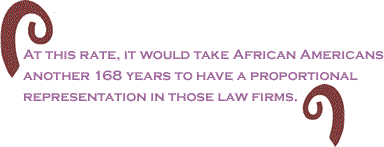
|
|||||||||||||||||||||
|
A mantra those of us in research methodology like to evoke goes as follows: Like beauty, the meaning of data is in the eyes of the beholder. Indeed, it was mathematician Henri Poincare who made the poignant observation that “Science is built up with facts as a house is with stones. But a collection of facts is no more a science than a heap of stones is a house.” In its report entitled “Diversity in Law Firms,” last modified on October 22, 2003, the United States Equal Employment Opportunity Commission (EEOC) seems to have relied on chains of inferences that, like all chains, are no stronger than their weakest links. While the report deals with women and other “minorities” and their representation in law firms, it is the case of African Americans that interests me. After examining changes in the employment of women and “minorities,” law firm organizational characteristics, status within the firms in terms of partners and associates, and additional information, the EEOC drew the following conclusions. First, from 1975 to 2002, the representation of African Americans as professionals in larger Legal Service firms “increased substantially.” Second, there were parallel increases in J.D. degrees from 1982 to 2002. Third, firm characteristics such as size, number of offices, locations, prestige and earnings rankings appeared to have more effect on the proportion of African American legal professionals. Fourth, African Americans were likely to be associated with firms in the top ten legal markets (cities) and in firms ranked in the top 100 on the basis of prestige and/or earnings. Fifth, large, nationally known firms generally had a higher proportion of African Americans than other types of law firms. Finally, however, African Americans had lower odds of being partners than white males (no surprise here!). Discounting the last conclusion, one would be tempted to break out the champagne and celebrate the “substantial increase” in the number of African Americans in law firms. But after careful analysis, such a celebration would prove to be premature, if not unwarranted. To begin with, from 1975 to 2002 (i.e. in 28 years), the percentage of African Americans in larger Legal Service firms increased from 2.3 to 4.4 percent. At this rate, it would take African Americans another 168 years to have a proportional representation (12.9 percent of the United States population) in those law firms. Next, from 1982 to 2002 (i.e. in 21 years), the percentage of African Americans with JD degrees rose from 4.2 to 7.2 percent. At this rate, it would take African Americans 84 more years to have a proportional representation among JD degree holders.
So, a major question that emerges here is the following: Why should we as African Americans worry about the report? The answer lies in the fact that the American political landscape is a muddled and combative arena. Since the beginnings of our republic, the battle lines have been indiscriminately multiplying into the intersecting web of strife we have today. From the debates sparked by the framing of our Constitution to the issue of slavery, and now the debate over affirmative action and reparations, our nation has been divided by interests and convictions. Thus, reports such this one by the EEOC will simply serve as fodder for anti‑affirmative action and anti‑reparations zealots. Even though as recently as the 1960s African Americans were routinely denied basic services at stores, diners, restaurants, and were denied entry into clubs and universities, these zealots still feel that African Americans have had it too good for too long. Such zealots, as we have seen throughout history, never see the proverbial light. How can they, when the logic presented to them does not bend reality in their favor or benefit. Abdul Karim Bangura holds a Ph.D. in Political Science, a Ph.D. in Development Economics, a Ph.D. in Linguistics, and a Ph.D. in Computer Science. He is a researcher‑in‑residence at the Center for Global Peace and a professor of International Relations in the School of International Service at American University, and the director of The African Institution. He is also the author of 35 books and more than 260 scholarly articles. Dr. Bangura can be contacted at [email protected] or at [email protected].
|
January
29,
2004 |
|||||||||
|
|||||||||
|
|
|||||||||
| Printer Friendly Version | |||||||||
 |
|||||||||
| |
|||||||||
| |
|||||||||


























